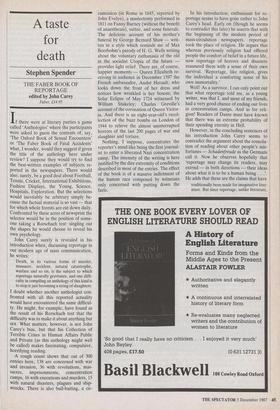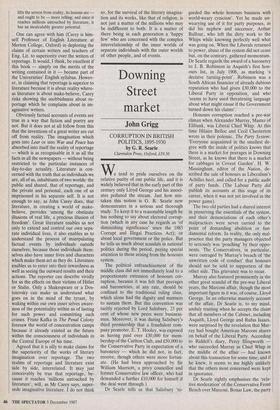A taste for death
Stephen Spender
THE FABER BOOK OF REPORTAGE edited by John Carey Faber, £14.95 If there were at literary parties a game called 'Anthologies' where the participants were asked to guess the contents of, say, `The Oxford Book of Sexual Encounters' or 'The Faber Book of Fatal Accidents' what, I wonder, would they suggest if given the title of the anthology here under review? I suppose they would try to find the best-written examples of subjects re- ported in the newspapers. There would also, surely, be a good deal about Football, Tennis, Cricket, International Exhibitions, Fashion Displays, the Young, Science, Hospitals, Exploration. But the selections would inevitably be arbitrary simply be- cause the factual material is so vast — that for which whole forests are cut down daily. Confronted by these acres of newsprint the selector would be in the position of some- one taking a Rorschach test: singling out the shapes he would choose to reveal his own psychology.
John Carey surely is revealed in his introduction when, discussing reportage in our modern age of mass communication, he writes:
Death, in its various forms of murder, massacre, accident, natural catastrophe, warfare and so on, is the subject to which reportage naturally gravitates, and one diffi- culty in compiling an anthology of this kind is to stop it just becoming a string of slaughters.
I doubt whether another anthologist con- fronted with all this reported actuality would have encountered the same difficul- ty. He might, for example, have found as the result of his Rorschach test that the difficulty was to make it about anything but sex. What matters, however, is not John Carey's bias, but that his Collection of Terrible Crises in Human Affairs Public and Private (as this anthology might well be called) makes fascinating, compulsive, horrifying reading.
A rough count shows that out of 300 entries here, 138 are concerned with war and invasion, 36 with revolutions, mas- sacres, imprisonments, concentration camps, 16 with executions and murders, 15 with natural disasters, plagues and ship- wrecks. There is also bull-baiting, a cir- cumcision (in Rome in 1645, reported by John Evelyn), a mastectomy performed in 1811 on Fanny Burney (without the benefit of anaesthesia), suttee, and some funerals. The delicious account of his mother's funeral by George Bernard Shaw — writ- ten in a style which reminds me of Max Beerbohm's parody of H. G. Wells writing about the voluntary euthanasia of the old in the socialist Utopia of the future provides light relief. There are, of course, happier moments — Queen Elizabeth re- ceiving in audience in December 1597 the French ambassador, Andre Herault, who looks down the front of her dress and notices how wrinkled is her bosom; the Solar Eclipse of May 1724 witnessed by William Stukeley; Charles Greville's account of the coronation of Queen Victor- ia. And there is an eight-year-old's recol- lection of the buzz bombs on London of 1944 to relieve the almost uninterrupted horrors of the last 200 pages of war and slaughter and torture. Nothing, I suppose, concentrates the reporter's mind like being the first journal- ist to enter a liberated Nazi concentration camp. The intensity of the writing is here justified by the dire extremity of conditions described in most of the entries. The effect of the book is of a massive indictment of the human race composed by witnesses only concerned with putting down the facts. In his introduction, enthusiasm for re- portage seems to have gone rather to John Carey's head. Early on (though he seems to contradict this later) he asserts that with the beginning of the modern period of mass-circulation newspapers, reportage took the place of religion. He argues that whereas previously religion had offered people the comfort of belief in a future life, now reportage of horrors and disasters reassured them with a sense of their own survival. 'Reportage, like religion, gives the individual a comforting sense of his own immortality.'
Well! As a survivor, I can only point out that what reportage told me, as a young writer, was that I, and most of my friends, had a very good chance of ending our lives in concentration camps. And as for reli- gion! Readers of Dante must have known that there was an extreme probability of their spending eternity in Hell.
However, in the concluding sentences of his introduction John Carey seems to contradict the argument about the consola- tion of reading about other people's mis- fortunes — Schadenfreude as the Germans call it. Now he observes hopefully that `reportage may change its readers, may extend — in both directions — their ideas about what it is to be a human being . . He adds that these are the claims that have
traditionally been made for imaginative liter- ature. But since reportage, unlike literature, lifts the screen from reality, its lessons are and ought to be — more telling; and since it reaches millions untouched by literature, it has an incalculably greater potential.
One can agree with him (Carey is him- self Professor of English Literature at Merton College, Oxford) in deploring the claims of certain writers and teachers of Eng. Lit. to superiority over the writers of reportage. It would, I think, be excellent if this book — simply on the merits of the writing contained in it — became part of the Universities' English syllabus. Howev- er, in claiming that reportage is superior to literature because it is about reality where- as literature is about make-believe, Carey risks showing the snobbishness about re- portage which he complains about in im- aginative writers.
Obviously factual accounts of events are true in a way that fiction and poetry are not. But it does not at all follow from this that the inventions of a great writer are cut off from reality. The imagination which goes into Lear or into War and Peace has absorbed into itself the reality of reportage — which is as recognisable in it as all the facts in all the newspapers — without being restricted to the particular instances of day-to-day actuality. Literature is con- cerned with the truth that as individuals we are, all of us, inhabitants of two worlds: the public and shared, that of reportage, and the private and personal, each one of us imprisoned in his separate self. It is not enough to say, as John Carey does, that literature, in creating a world of make- believe, provides 'among the obstinate illusions of real life, a precious illusion of freedom'. Great literature enables us not only to extend and control our own sepa- rate individual lives, it also enables us to understand the process of manipulating factual events by individuals outside ourselves, because those individuals them- selves also have inner lives and characters which make them act as they do. Literature enables us to enter into their inwardness as well as seeing the outward results and their actions. The reporter can describe vividly for us the effects on their victims of Hitler or Stalin. Only a Shakespeare or a Dos- toievsky can make us understand what goes on in the mind of the tyrant, by waking within our own inner selves aware- ness of the potentiality within us of lusting for such power and committing such crimes. Franz Kafka in The Penal Colony foresaw the world of concentration camps because it already existed as the future within the consciousness of individuals in the Central Europe of his time.
Agreed that it is silly to make claims for the superiority of the works of literary imagination over reportage. The two realms of reportage and literature exist side by side, interrelated. It may just conceivably be true that reportage, be- cause it reaches 'millions untouched by literature', will, as Mr Carey says, super- sede imaginative literature. I do not think so, for the survival of the literary imagina- tion and its works, like that of religion, is not just a matter of the millions who may be indifferent to both. It is a matter of there being in each generation a 'happy few' who are concerned with the complex interrelationship of the inner worlds of separate individuals with the outer worlds of other people, and of events.











































































 Previous page
Previous page